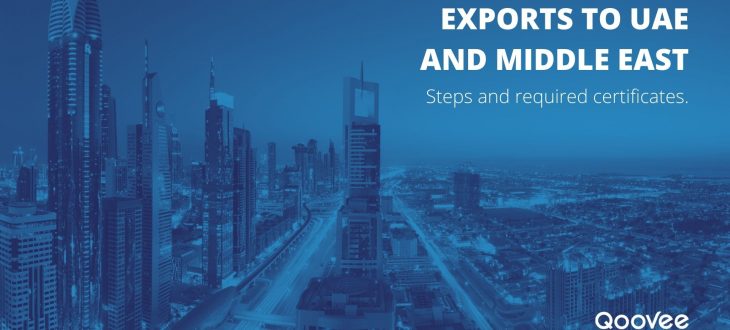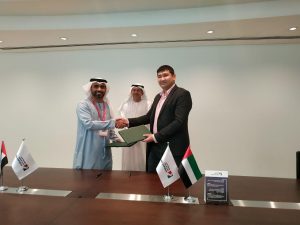In this article you will learn how to enter the Middle East market, required steps and instructions for obtaining certificates for the export of food products, on how to promote your goods in the Middle East and much more.
The main economic and political association in the Middle East is the Cooperation Council for the Arab States of the Persian Gulf (GCC), which comprises six countries: Bahrain, Kuwait, Oman, Qatar, Saudi Arabia and the United Arab Emirates.
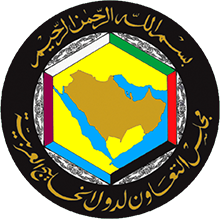
Figures and some facts about the GCC
- Population: 56 million people
- GDP: 1.6 trillion $ (2018)
- 85% of GDP comes from Saudi Arabia and the UAE.
A strong economy and growing population make the Middle East a priority market for all countries in the world.
But so far, only few countries have taken advantage of this opportunity and are actively trading with the countries in the Middle East.
Trade turnover between the EAEU and the GCC
The main export goods to the GCC from the EAEU countries are agricultural and food products.
In various business forums, social networks or from your fellow entrepreneurs, for sure, you often listen to phrases such as “Our honey is valued in the Emirates”, “There is a good potential for exporting ECO products and meat to the Middle East”
But, let’s look at the numbers.
Collectively, the Gulf countries are quite large importers of agricultural products. In 2018, they account for 4.5 per cent of world imports ($74.0 billion)
The trade turnover of agricultural products of the EAEU with the countries of the Persian Gulf in 2018 amounted to almost 1.15 billion dollars (data from the statistical database of the International Trade Center)
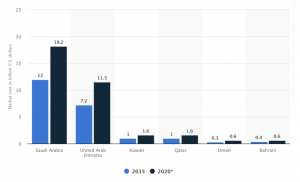
In general, the EAEU has positive statistics on agricultural trade with the Gulf countries. However, why is the current trade turnover not increasing?
The GCC is open for new high-quality partnerships in this direction, as there is an increase in the volume of the food and beverage market in the GCC. In the UAE alone, over the past 5 years, the food sector has grown from $ 7.2 billion to $ 11.5 billion. And these numbers will only grow.
And players from the CIS should already take their places in this market.
Known barriers and “solutions”. Real barriers and solutions
Well-known barriers:
- Non-compliance with «halal» and international food safety standards
- Production shortfall
- Shortage of quality control laboratories
Well-known “solutions”:
- Have to meet «halal» standard and international food safety standards
- Food production must be increased
- We need to open quality control laboratories
Real barriers:
Yes, all known barriers exist, but we have identified real barriers and solutions
- Only few know HOW
Only few know HOW to really solve these barriers and enter the Middle East market.
For example, only a few companies have an official right to export meat to the UAE. For example, Kyrgyzstan 1, Kazakhstan 3, Russia 8.
This is very low when one considers the fact that meat consumption there will still increase to 70% by 2050 [FAO Annual Report]. The UAE is currently heavily dependent on imports from international markets such as Australia, India, New Zealand, Somalia and Oman.
We have not found a single resource in the CIS Internet area where the steps for a solution are clearly presented step by step. We have not found answers to the following questions:
- How do I get certificates from who?
- Which certification organizations are accredited by the authorities of the countries of the Middle East?
- How can laboratories and certification organizations be accredited so that the documents they issue can be accepted by countries in the Middle East ?
- How do you know what standards you have to meet to adjust production to a market this big?
- How do we promote our products in the Middle East?
- How to organize logistics?
Real solutions:
In order to be able to increase the turnover of this huge market as a society, all parties (exporters, producers, foreign trade authorities, certification organizations) need to understand the potential, understand the need of entering this market, and most importantly understand HOW to enter.
We, the Qoovee team, have learned HOW. Some barriers we have already solved and some are in process. And in this article we present the clear steps and instructions for all parties.
Due to the similarity of systems and common GCC laws, we will present solutions based on the UAE, the country’s second largest economy and hub for international trade and logistics in the region.
How do you know what standards you need to meet in order to adjust production for such a large market?
Which body sets standards for food safety compliance in the UAE?

The Emirates Standardization and Metrology Authority (ESMA) was established as the only standardization body in the UAE. The ESMA Council includes representatives from the main standardization parties in the country. These are the ministries of economy, agriculture, chambers of commerce, etc.
ESMA is the main government representative for standardization from the UAE in the GCC.
What certificates and documents are needed to export food products to the UAE?
- Certificate of origin (for any goods)
The certificate of origin is issued by the Chamber of Commerce and Industry of the exporting country
- Invoice (for any goods)
The invoice and invoice are issued by the exporter’s company.
- HALAL certificate (for the supply of meat and meat products)
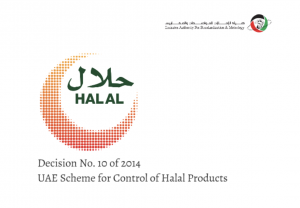
This certificate is the most important for food supply, especially for meat supply, since all countries in GCC are Muslim and state requirements. organs high in this direction. This is the only certificate that requires the involvement of public authorities not only in the exporting country but also in one of the GCC countries.
List of approved ESMA organizations that can issue accreditation to companies (e.g. Islamic centers) from which manufacturers and suppliers of animal slaughtering services must obtain the certification. The UAE state authorities recognize the HALAL certificates issued by those companies that have been accredited by the ESMA confirmed HALAL certification organizations.
ESMA
List of approved organizations
Companies that can issue certificates
Exporter
The main reason for the absence of companies issuing HALAL certificates in the CIS countries is precisely the lack of organizations that can accredit companies issuing these certificates.
At the moment, there is only one confirmed organization in the CIS area – Belarusian State Accreditation Centre.
How do I become a certified HALAL Certificate Accreditation Organization? Instructions and Steps to Obtain Confirmation from ESMA
BUT, the lack of companies issuing HALAL certificates CAN BE SOLVED! How few companies in the CIS managed to solve this.
Here is a list of exporting companies that can export meat to the UAE. Among these companies you will find only a few companies from the CIS countries. These are mainly large companies, with the entire logistics chain, from animal housing to animal slaughter services.
Most of these companies have obtained HALAL certificates directly from the UAE Ministry of Climate Change and Environment.
You will find instructions to obtain the HALAL certificate directly from the UAE Ministry of Climate Change and Environment in 3 steps.
But before you send your application and pay, please review the terms and standards for which the certificate is issued.
These standards should be bought and downloaded in PDF format on the official ESMA website.
It is also possible to obtain HALAL certificate from private companies outside the CIS, which are confirmed by the GCC Accreditation Center.
- Phytosanitary and Health Certificate (for supply of agricultural products and cereals).
These certificates are issued by the Ministry of Agriculture of the exporting country.
For Ministries of Agriculture
The Ministries of Agriculture of the EEA countries should actively communicate and constantly learn about market requirements and introduce this information into the Phytosanitary Certificate and Health Certificate process for domestic exporters.
In addition, the exporter must always specify the list of documents at the receiving party and what documents need to be translated into Arabic or English and notarized. It will vary according to the type of product to be exported.
And the most important thing is PROMOTION!
Promotion is the most important factor when entering a foreign market. Correct promotion is the way to reach buyers.
You need to customize your site for a specific country, constantly invest in advertising, maintain a team of marketers with knowledge of the language and culture of the country in which you want to promote.
The most optimal solution is to place your company on the International B2B marketplace Qoovee.com and launch a promotion.
Qoovee is an official partner of the Dubai Government (in the person of Dubai Exports and Industries) in international trade. The agreement was signed in Dubai. More about it here.
Below is one of the successful deals between an exporter from the CIS and a buyer from the UAE that was made with the help of Qoovee.
Share these valuable and exclusive data with your business community! This is your contribution to the development of your country’s economy!

